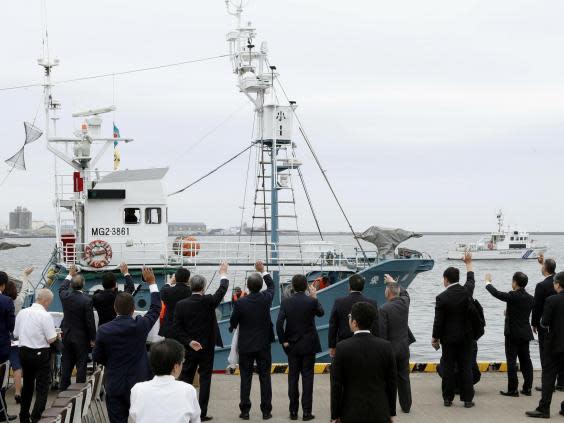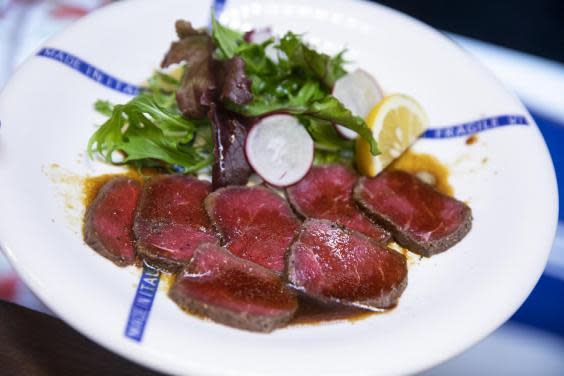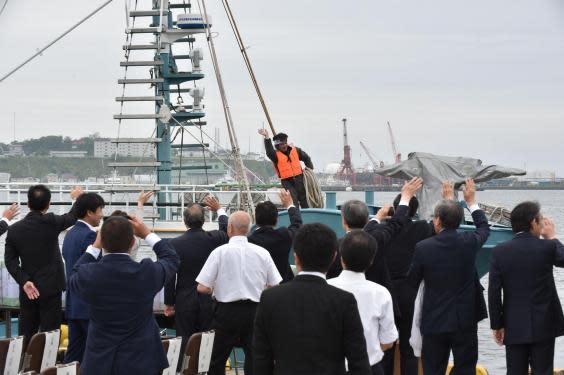Japanese ships begin commercial slaughter of whales for first time in 31 years despite international condemnation
Japan’s first ships to embark on a commercial whale hunt in 31 years have sailed out of port - amidst international condemnation of the move.
The mother boat Nisshin-maru and two support boats that used to go to the Antarctic will travel within Japan's 200 nautical mile exclusive economic zone (EEZ) to catch minke, Bryde's and sei whales.
Five other smaller ships will stay closer to the coast but also hunt minkes, in addition to Baird's beaked whales and dolphins that they used to catch under an IWC loophole.
The move to commence commercial whaling follows Japan’s decision to withdraw from the International Whaling Commission (IWC).
The country, which has long maintained few of the species it wants to hunt are endangered, had given its notice to do so in December last year - a decision which became official on Sunday.
Japan's departure from the IWC was the culmination of years of campaigning by industry supporters and Prime Minister Shinzo Abe, whose constituency includes a city that has traditionally been a base for whaling.
Nicola Beynon, of Humane Society International, said it was a “sad day” for whale protection.
"The word 'research' may have been removed from the side of the factory ship, finally ending Japan's charade of harpooning whales under the guise of science, but these magnificent creatures will still be slaughtered for no legitimate reason,” she said.
The last time Japanese ships went out on a commercial hunt was in 1988. In the years since the Asian nation claimed all whaling activities were for research purposes.

The country's Fisheries Agency said the catch quota for 2019, which will be limited to whales in its EEZs, was set at 227 whales.
This is fewer than the 333 Japan hunted in the Antarctic in recent years.
Hideki Moronuki, a Fisheries Agency official and a chief negotiator at the IWC, said Japan's commercial whaling would never harm its stock and it would stick to a very strict catch quota with respect to the IWC findings, and continue conducting research.
As the boats left port, whalers, their families and local officials in two major whaling towns, Shimonoseki in southwestern Japan, Prime Minister Shinzo Abe's electoral constituency, and Kushiro in the north, celebrated the fresh start.
Deputy chief cabinet secretary Yasutoshi Nishimura told reporters in Tokyo the move would contribute to local prosperity.
"We hope commercial whaling will be on track as soon as possible ... and carry on Japan's rich whale culture to the next generation," he said.
While the resumption of commercial whaling is condemned by many conservation groups, others see it as a face-saving way to let the government's embattled and expensive whaling programme gradually succumb to changing times and tastes.
Despite the massive attention, tax income and political support from ruling party politicians, whaling in Japan involved only a few hundred people and accounted for less than 0.1 per cent of total meat consumption in the year to April 2018, according to the latest government data on food sufficiency.

Whale meat was an affordable source of protein during the lean times after the Second World War, with consumption peaking at 223,000 tons in 1962 before it started being replaced with other meats.
It had dropped to 6,000 tons in 1986, a year before the commercial whaling moratorium imposed by the IWC.
Japan began whaling for scientific research in 1987, which it insisted was carried out to gather crucial population data, and abandoned commercial whaling the following year.
Under the research hunts, catches peaked at 1,200 whales, but that number has seen a sharp decline in recent years after international protests escalated and whale meat consumption slumped at home.
These hunts were condemned by many who believed they were just a cover for commercial hunts as the meat was sold on the market.
Today, about 4,000-5,000 tons are supplied to Japan annually, or 30-40 grams of whale meat consumed per person a year, Fisheries Agency officials say.
In the move to commercial whaling, those whales caught in coastal waters are expected to be brought back for fresh local consumption at any of six local whaling hubs that are mainly in northern Japan but include Taiji, the home constituency of ruling Liberal Democratic Party heavyweight Toshihiro Nikai.
The town was also known for dolphin hunts because of the documentary film "The Cove."
Whale meat caught further off the coast will be frozen and distributed for wider consumption.

Fisheries Agency official Hideki Moronuki said the fate of commercial whaling depended on whether whale meat was widely accepted by consumers, as subsidies it used to get are no longer available.
He hoped whale meat would be reasonably priced so it would gain popularity in the long term instead of becoming an expensive delicacy for a limited clientele.
"If we had more whale available, we'd eat it more," said Sachiko Sakai, a 66-year-old taxi driver in Kushiro, a gritty port city on the northernmost main island of Hokkaido, where the whaling ships were waved out of harbour in a brief ceremony.
"It's part of Japan's food culture," said Sakai, adding that she ate a lot of whale as a child.
"The world opposes killing whales, but you can say the same thing about many of the animals bred on land and killed for food."
Additional reporting by Associated Press and Reuters
